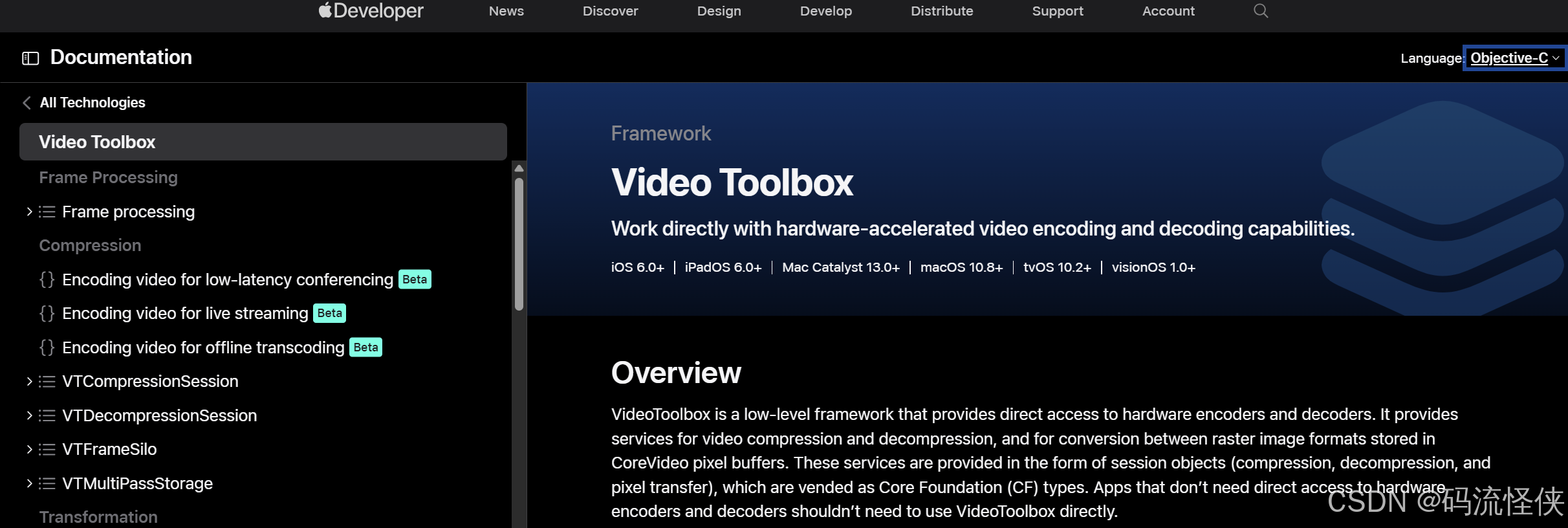深入理解VideoToolbox:iOS/macOS视频硬编解码实战指南

引言:VideoToolbox框架概述
VideoToolbox是Apple提供的底层框架,首次在WWDC2014上推出,为iOS和macOS开发者提供直接访问硬件编码器和解码器的能力。作为Core Media框架的重要组成部分,VideoToolbox专注于视频压缩、解压缩以及CoreVideo像素缓冲区之间的格式转换,以Core Foundation (CF)类型的会话对象形式提供服务。
与AVFoundation等高层框架不同,VideoToolbox专为需要直接硬件访问的场景设计,适用于对性能要求严苛的应用,如实时视频通信、专业视频编辑和高分辨率媒体处理。对于不需要直接硬件控制的应用,Apple建议使用AVFoundation等更高级的框架。
支持平台与系统要求
VideoToolbox支持以下Apple平台:
- iOS 8.0+:iPhone、iPad和iPod touch设备
- macOS 10.8+:Macintosh计算机
- tvOS 10.2+:Apple TV设备
- visionOS 1.0+:Apple Vision Pro
框架采用硬件加速设计,充分利用Apple芯片中的媒体引擎,包括A系列芯片中的专用编解码模块和Apple Silicon的媒体处理单元(MPU),实现高效的视频处理。
核心架构与功能组件
框架核心组件
VideoToolbox提供三种主要会话类型,构成其核心架构:
- VTCompressionSession:视频编码会话,负责将原始视频数据压缩为H.264/HEVC等格式
- VTDecompressionSession:视频解码会话,负责将压缩视频数据解码为原始像素缓冲区
- VTPixelTransferSession:像素转换会话,处理不同像素格式之间的转换
这些会话对象通过属性键值对进行配置,支持细粒度的参数调整,以满足不同应用场景需求。
支持的编解码格式
VideoToolbox支持多种视频编解码格式:
编码支持:
- H.264/AVC (所有支持平台)
- HEVC/H.265 (iOS 11+/macOS 10.13+)
- ProRes (macOS)
解码支持:
- H.263、H.264、HEVC
- MPEG-1、MPEG-2、MPEG-4 Part 2
- ProRes、ProRes Raw
- AV1 (部分设备)
硬件加速原理
VideoToolbox的硬件加速能力源于其直接访问Apple设备专用硬件编码器/解码器的能力:
- 专用硬件模块:Apple芯片包含专用的媒体处理单元,独立于CPU和GPU运作
- 低功耗设计:硬件编解码比软件实现减少70-80%的功耗
- 零拷贝优化:支持直接在GPU内存和编解码器之间传输数据,减少CPU干预
- 并行处理:硬件编码器可与CPU并行工作,提高整体系统性能
视频编码流程详解
编码基本流程
使用VTCompressionSession进行视频编码的核心步骤:
- 创建压缩会话:使用VTCompressionSessionCreate函数初始化
- 配置会话属性:设置码率、帧率、分辨率等编码参数
- 输入视频帧:通过VTCompressionSessionEncodeFrame输入CVPixelBuffer
- 处理编码结果:在回调函数中接收编码后的CMSampleBuffer
- 结束编码会话:调用VTCompressionSessionCompleteFrames和VTCompressionSessionInvalidate
创建压缩会话
static void EncodeCallBack(void *outputCallbackRefCon, void *sourceFrameRefCon, OSStatus status, VTEncodeInfoFlags infoFlags, CMSampleBufferRef sampleBuffer) {// 处理编码后的样本缓冲区if (status == noErr && sampleBuffer) {// 编码成功,处理输出数据NSLog(@"编码成功,样本缓冲区大小: %zd", CMSampleBufferGetTotalSampleSize(sampleBuffer));// 在这里可以将编码数据写入文件或发送网络} else {NSLog(@"编码失败,状态码: %d", (int)status);}
}- (void)createCompressionSession {int width = 1920;int height = 1080;CMVideoCodecType codecType = kCMVideoCodecType_H264;OSStatus status = VTCompressionSessionCreate(NULL, // 分配器width, // 宽度height, // 高度codecType, // 编解码器类型NULL, // 编码器规格NULL, // 源图像缓冲区属性NULL, // 压缩数据分配器EncodeCallBack, // 输出回调函数(__bridge void *)self, // 回调引用&_compressionSession // 会话输出);if (status != noErr) {NSLog(@"创建压缩会话失败,状态码: %d", (int)status);return;}// 配置实时编码属性VTSessionSetProperty(_compressionSession, kVTCompressionPropertyKey_RealTime, kCFBooleanTrue);// 准备编码VTCompressionSessionPrepareToEncodeFrames(_compressionSession);
}
配置编码参数
VideoToolbox提供丰富的编码参数配置选项,以下是常用属性设置:
- (void)configureCompressionProperties {// 设置码率控制模式为ABR(平均比特率)int averageBitRate = 5000000; // 5MbpsCFNumberRef bitRateRef = CFNumberCreate(kCFAllocatorDefault, kCFNumberSInt32Type, &averageBitRate);VTSessionSetProperty(_compressionSession, kVTCompressionPropertyKey_AverageBitRate, bitRateRef);CFRelease(bitRateRef);// 设置帧率int frameRate = 30;CFNumberRef frameRateRef = CFNumberCreate(kCFAllocatorDefault, kCFNumberSInt32Type, &frameRate);VTSessionSetProperty(_compressionSession, kVTCompressionPropertyKey_ExpectedFrameRate, frameRateRef);CFRelease(frameRateRef);// 设置关键帧间隔(GOP大小)int maxKeyFrameInterval = frameRate * 2; // 2秒一个关键帧CFNumberRef keyFrameIntervalRef = CFNumberCreate(kCFAllocatorDefault, kCFNumberSInt32Type, &maxKeyFrameInterval);VTSessionSetProperty(_compressionSession, kVTCompressionPropertyKey_MaxKeyFrameInterval, keyFrameIntervalRef);CFRelease(keyFrameIntervalRef);// 设置H.264 Profile LevelVTSessionSetProperty(_compressionSession, kVTCompressionPropertyKey_ProfileLevel, kVTProfileLevel_H264_High_AutoLevel);// 禁用B帧(减少延迟)VTSessionSetProperty(_compressionSession, kVTCompressionPropertyKey_AllowFrameReordering, kCFBooleanFalse);
}
编码视频帧
将从摄像头或其他源获取的CVPixelBuffer输入到编码会话:
- (void)encodePixelBuffer:(CVPixelBufferRef)pixelBuffer presentationTime:(CMTime)presentationTime {if (!_compressionSession) {NSLog(@"压缩会话未初始化");return;}// 设置帧时间戳VTEncodeInfoFlags flags = 0;OSStatus status = VTCompressionSessionEncodeFrame(_compressionSession,pixelBuffer,presentationTime,kCMTimeInvalid, // 持续时间NULL, // 编码选项NULL, // 源帧引用&flags // 编码信息标志);if (status != noErr) {NSLog(@"编码帧失败,状态码: %d", (int)status);// 处理编码失败,可能需要重新创建会话}
}
视频解码流程详解
解码基本流程
使用VTDecompressionSession进行视频解码的核心步骤:
- 创建格式描述:从SPS/PPS或编码数据创建CMVideoFormatDescription
- 创建解压缩会话:使用VTDecompressionSessionCreate函数初始化
- 配置解码参数:设置像素格式、解码模式等
- 输入编码数据:通过VTDecompressionSessionDecodeFrame输入编码数据
- 处理解码结果:在回调中接收解码后的CVPixelBuffer
- 释放解码会话:调用VTDecompressionSessionInvalidate释放资源
创建解压缩会话
static void DecodeCallBack(void *decompressionOutputRefCon, void *sourceFrameRefCon, OSStatus status, VTDecodeInfoFlags infoFlags, CVImageBufferRef imageBuffer, CMTime presentationTime, CMTime presentationDuration) {// 处理解码后的图像缓冲区if (status == noErr && imageBuffer) {// 解码成功,处理图像数据NSLog(@"解码成功,图像尺寸: %dx%d", CVPixelBufferGetWidth(imageBuffer), CVPixelBufferGetHeight(imageBuffer));// 在这里可以将图像显示到屏幕或进行后续处理} else {NSLog(@"解码失败,状态码: %d", (int)status);}
}- (void)createDecompressionSessionWithFormatDescription:(CMVideoFormatDescriptionRef)formatDescription {// 设置输出像素缓冲区属性NSDictionary *destinationImageBufferAttributes = @{(id)kCVPixelBufferPixelFormatTypeKey : @(kCVPixelFormatType_32BGRA),(id)kCVPixelBufferWidthKey : @(CVPixelBufferGetWidth(imageBuffer)),(id)kCVPixelBufferHeightKey : @(CVPixelBufferGetHeight(imageBuffer)),(id)kCVPixelBufferIOSurfacePropertiesKey : @{}};OSStatus status = VTDecompressionSessionCreate(NULL, // 分配器formatDescription, // 视频格式描述NULL, // 解码器规格(__bridge CFDictionaryRef)destinationImageBufferAttributes, // 目标图像属性&_decompressionSession // 会话输出);if (status != noErr) {NSLog(@"创建解压缩会话失败,状态码: %d", (int)status);return;}// 设置解码回调VTDecompressionSessionSetOutputCallback(_decompressionSession,DecodeCallBack,(__bridge void *)self,NULL);
}
处理H.264码流格式
VideoToolbox仅支持AVCC/HVCC格式的码流,需要将Annex-B格式转换为AVCC格式:
- (CMSampleBufferRef)sampleBufferFromH264Data:(NSData *)h264Data formatDescription:(CMVideoFormatDescriptionRef *)formatDescription {const uint8_t *bytes = [h264Data bytes];size_t length = [h264Data length];// 查找NALU起始码NSMutableArray *naluArray = [NSMutableArray array];size_t start = 0;for (size_t i = 2; i < length; i++) {if (bytes[i] == 0x01 && bytes[i-1] == 0x00 && bytes[i-2] == 0x00) {size_t naluSize = i - start - 3;if (naluSize > 0) {[naluArray addObject:[NSData dataWithBytes:bytes+start+3 length:naluSize]];}start = i + 1;}}// 处理SPS和PPS创建格式描述if (*formatDescription == NULL) {for (NSData *naluData in naluArray) {const uint8_t *naluBytes = [naluData bytes];uint8_t naluType = naluBytes[0] & 0x1F;if (naluType == 7) { // SPS_spsData = naluData;} else if (naluType == 8) { // PPS_ppsData = naluData;if (_spsData && _ppsData) {const uint8_t *sps = [_spsData bytes];const uint8_t *pps = [_ppsData bytes];int spsSize = (int)[_spsData length];int ppsSize = (int)[_ppsData length];// 创建格式描述OSStatus status = CMVideoFormatDescriptionCreateFromH264ParameterSets(kCFAllocatorDefault,1,&sps, &spsSize,&pps, &ppsSize,4, // NALU长度字段大小formatDescription);if (status != noErr) {NSLog(@"创建格式描述失败,状态码: %d", (int)status);}}}}}// 创建CMBlockBuffer和CMSampleBufferif (*formatDescription) {CMBlockBufferRef blockBuffer = NULL;OSStatus status = CMBlockBufferCreateWithMemoryBlock(kCFAllocatorDefault,(void *)bytes,length,kCFAllocatorNull,NULL,0,length,0,&blockBuffer);if (status != noErr) {NSLog(@"创建BlockBuffer失败,状态码: %d", (int)status);return NULL;}CMSampleBufferRef sampleBuffer = NULL;const size_t sampleSize = length;status = CMSampleBufferCreateReady(kCFAllocatorDefault,blockBuffer,*formatDescription,1,0,NULL,1,&sampleSize,&sampleBuffer);if (status != noErr) {NSLog(@"创建SampleBuffer失败,状态码: %d", (int)status);CFRelease(blockBuffer);return NULL;}return sampleBuffer;}return NULL;
}
解码视频数据
将编码数据输入到解压缩会话进行解码:
- (void)decodeH264Data:(NSData *)h264Data {CMVideoFormatDescriptionRef formatDescription = NULL;CMSampleBufferRef sampleBuffer = [self sampleBufferFromH264Data:h264Data formatDescription:&formatDescription];if (!sampleBuffer) {NSLog(@"无法创建SampleBuffer");return;}if (!_decompressionSession && formatDescription) {[self createDecompressionSessionWithFormatDescription:formatDescription];}if (_decompressionSession) {VTDecodeFrameFlags flags = kVTDecodeFrame_EnableAsynchronousDecompression;VTDecodeInfoFlags infoFlags = 0;OSStatus status = VTDecompressionSessionDecodeFrame(_decompressionSession,sampleBuffer,flags,NULL, // 源帧引用&infoFlags);if (status != noErr) {NSLog(@"解码帧失败,状态码: %d", (int)status);}}CFRelease(sampleBuffer);if (formatDescription) CFRelease(formatDescription);
}
高级应用与性能优化
低延迟编码配置
对于实时视频通信场景,配置低延迟编码模式:
- (void)configureLowLatencyEncoding {// 创建低延迟编码器规格CFDictionaryRef encoderSpecification = @{(id)kVTVideoEncoderSpecification_EnableLowLatencyRateControl: @YES};// 使用低延迟规格创建会话OSStatus status = VTCompressionSessionCreate(NULL,_width,_height,kCMVideoCodecType_H264,encoderSpecification, // 使用低延迟规格NULL,NULL,EncodeCallBack,(__bridge void *)self,&_compressionSession);if (status != noErr) {NSLog(@"创建低延迟压缩会话失败,状态码: %d", (int)status);return;}// 禁用B帧(低延迟关键配置)VTSessionSetProperty(_compressionSession, kVTCompressionPropertyKey_AllowFrameReordering, kCFBooleanFalse);// 设置最大帧延迟为1(最小化延迟)int maxFrameDelay = 1;CFNumberRef maxFrameDelayRef = CFNumberCreate(kCFAllocatorDefault, kCFNumberSInt32Type, &maxFrameDelay);VTSessionSetProperty(_compressionSession, kVTCompressionPropertyKey_MaxFrameDelayCount, maxFrameDelayRef);CFRelease(maxFrameDelayRef);// 使用Constrained Baseline Profile提高兼容性VTSessionSetProperty(_compressionSession, kVTCompressionPropertyKey_ProfileLevel, kVTProfileLevel_H264_ConstrainedBaseline_AutoLevel);
}
性能对比与优化策略
VideoToolbox与其他编码方案的性能对比:
| 编码方案 | 速度 | 质量 | CPU占用 | 功耗 | 适用场景 |
|---|---|---|---|---|---|
| VideoToolbox硬件编码 | 快(5-10x) | 中等 | 低(25-30%) | 低 | 实时通信、直播 |
| libx264软件编码 | 慢 | 高 | 高(100%) | 高 | 高质量视频制作 |
| FFmpeg+VAAPI | 中(3-5x) | 中高 | 中(50-60%) | 中 | 跨平台桌面应用 |
优化建议:
-
码率控制:
- 实时场景使用ABR模式,设置合理的最小/最大码率
- 存储场景可使用CQ模式,通过
-q:v参数控制质量
-
线程管理:
- 使用专用串行队列处理编解码操作
- 避免在回调中执行耗时操作
-
内存优化:
- 复用CVPixelBuffer对象,减少内存分配
- 监控内存使用,避免在扩展中使用VTPixelRotationSession
-
错误恢复:
- 实现会话重建机制,处理编解码失败
- 使用长期参考帧(LTR)提高丢包恢复能力
实际应用案例
案例1:实时视频会议应用
使用VideoToolbox实现低延迟视频编码:
// 配置低延迟参数
[self configureLowLatencyEncoding];// 设置目标码率为1-2Mbps(适合视频会议)
int averageBitRate = 1500000; // 1.5Mbps
CFNumberRef bitRateRef = CFNumberCreate(kCFAllocatorDefault, kCFNumberSInt32Type, &averageBitRate);
VTSessionSetProperty(_compressionSession, kVTCompressionPropertyKey_AverageBitRate, bitRateRef);
CFRelease(bitRateRef);// 设置较小的GOP大小(1秒)
int frameRate = 30;
int maxKeyFrameInterval = frameRate * 1; // 1秒一个关键帧
CFNumberRef keyFrameIntervalRef = CFNumberCreate(kCFAllocatorDefault, kCFNumberSInt32Type, &maxKeyFrameInterval);
VTSessionSetProperty(_compressionSession, kVTCompressionPropertyKey_MaxKeyFrameInterval, keyFrameIntervalRef);
CFRelease(keyFrameIntervalRef);
案例2:4K视频录制应用
优化高分辨率视频编码性能:
// 配置4K编码参数
int width = 3840;
int height = 2160;
CMVideoCodecType codecType = kCMVideoCodecType_HEVC; // 使用HEVC提高压缩效率// 创建压缩会话
OSStatus status = VTCompressionSessionCreate(NULL, width, height, codecType, NULL, NULL, NULL, EncodeCallBack, (__bridge void *)self, &_compressionSession);// 设置高码率(4K建议20-30Mbps)
int averageBitRate = 25000000; // 25Mbps
CFNumberRef bitRateRef = CFNumberCreate(kCFAllocatorDefault, kCFNumberSInt32Type, &averageBitRate);
VTSessionSetProperty(_compressionSession, kVTCompressionPropertyKey_AverageBitRate, bitRateRef);
CFRelease(bitRateRef);// 启用硬件加速优先模式
CFDictionaryRef encoderSpecification = @{(id)kVTVideoEncoderSpecification_RequireHardwareAcceleratedVideoEncoder: @YES
};
常见问题与解决方案
问题1:编码会话创建失败
可能原因:
- 不支持的编解码器类型
- 分辨率超出硬件限制
- 设备不支持特定功能
解决方案:
- (BOOL)createCompressionSessionWithCodecType:(CMVideoCodecType)codecType {// 检查硬件支持情况BOOL isSupported = NO;if (codecType == kCMVideoCodecType_HEVC) {if (@available(iOS 11.0, *)) {isSupported = VTIsHardwareDecodeSupported(codecType);} else {isSupported = NO;}} else {isSupported = VTIsHardwareDecodeSupported(codecType);}if (!isSupported) {NSLog(@"当前设备不支持%@硬件编码", codecType == kCMVideoCodecType_HEVC ? @"HEVC" : @"H.264");// 降级为支持的编解码器codecType = kCMVideoCodecType_H264;}// 检查分辨率限制CGSize maxResolution = [self maxSupportedResolutionForCodec:codecType];if (_width > maxResolution.width || _height > maxResolution.height) {NSLog(@"分辨率超出硬件限制,调整为%@", NSStringFromCGSize(maxResolution));_width = maxResolution.width;_height = maxResolution.height;}// 创建会话...return YES;
}
问题2:编码质量不佳
可能原因:
- 码率设置过低
- Profile Level设置不当
- 未启用CABAC熵编码
解决方案:
// 提高编码质量的配置
- (void)improveEncodingQuality {// 提高目标码率int averageBitRate = 8000000; // 8Mbps for 1080pCFNumberRef bitRateRef = CFNumberCreate(kCFAllocatorDefault, kCFNumberSInt32Type, &averageBitRate);VTSessionSetProperty(_compressionSession, kVTCompressionPropertyKey_AverageBitRate, bitRateRef);CFRelease(bitRateRef);// 使用High ProfileVTSessionSetProperty(_compressionSession, kVTCompressionPropertyKey_ProfileLevel, kVTProfileLevel_H264_High_AutoLevel);// 启用CABAC熵编码if ([self isSupportPropertyWithSession:_compressionSession key:kVTCompressionPropertyKey_H264EntropyMode]) {VTSessionSetProperty(_compressionSession, kVTCompressionPropertyKey_H264EntropyMode, kVTH264EntropyMode_CABAC);}// 设置最大QP值,限制质量下限int maxQP = 35; // 数值越小质量越高,范围0-51CFNumberRef maxQPRef = CFNumberCreate(kCFAllocatorDefault, kCFNumberSInt32Type, &maxQP);VTSessionSetProperty(_compressionSession, kVTCompressionPropertyKey_MaxAllowedFrameQP, maxQPRef);CFRelease(maxQPRef);
}
问题3:解码画面闪烁或花屏
可能原因:
- NALU格式不正确
- SPS/PPS参数集缺失或错误
- 时间戳不连续
解决方案:
// 确保正确处理SPS/PPS
- (void)handleParameterSets {// 在每个IDR帧前发送SPS/PPSif (naluType == 5) { // IDR帧if (_spsData && _ppsData) {[self sendNALU:_spsData]; // 发送SPS[self sendNALU:_ppsData]; // 发送PPS}}// 验证时间戳连续性if (CMTIME_IS_VALID(_lastPresentationTime) && CMTimeCompare(presentationTime, _lastPresentationTime) <= 0) {NSLog(@"时间戳不连续,校正时间戳");presentationTime = CMTimeAdd(_lastPresentationTime, CMTimeMake(1, 30)); // 假设30fps}_lastPresentationTime = presentationTime;
}
总结与展望
VideoToolbox框架为Apple平台提供了强大的硬件加速视频编解码能力,是开发高性能视频应用的关键技术。通过直接访问硬件编码器/解码器,VideoToolbox能够在保持低CPU占用和低功耗的同时,提供高效的视频处理能力。
主要优势:
- 卓越的性能:硬件加速比软件编码快5-10倍
- 低功耗设计:延长移动设备电池寿命
- 紧密集成:与Core Media和AVFoundation无缝协作
- 持续演进:支持最新的编解码标准和硬件特性
未来发展方向:
- AV1编解码支持的进一步完善
- 空间视频编码的增强(Vision Pro生态)
- AI辅助编码优化
- 更精细的码率控制和质量优化
对于需要处理视频的iOS/macOS开发者,掌握VideoToolbox框架将为应用带来显著的性能提升和用户体验改善。通过合理配置参数、优化工作流程和妥善处理边缘情况,开发者可以充分发挥Apple设备的硬件潜力,构建出色的视频应用。
参考资料
- Apple官方文档 - VideoToolbox
- WWDC2021 - 探索低延迟视频编码
- H.264/HEVC码流格式详解
- VideoToolbox性能优化指南
- FFmpeg与VideoToolbox集成
